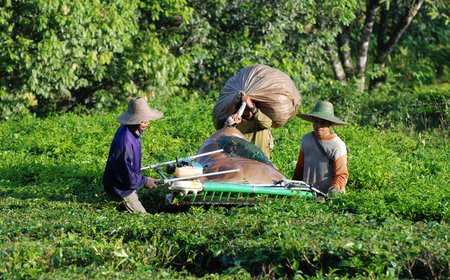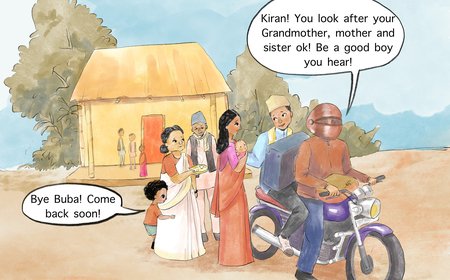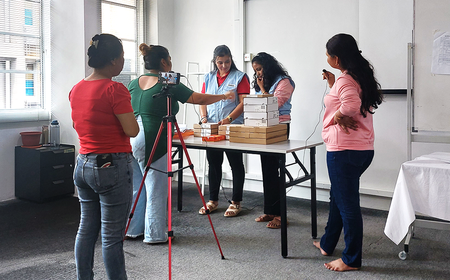This blog explores how creative outputs based on research findings can provide a forum for engagement and dialogue with a variety of audiences through community screenings held in Malaysia and Nepal.
An integral part of the Impact and Engagement strategy adopted by the MIDEQ Malaysia team was to produce a diverse range of evidenced-based outputs for dialoguing with different publics – including foreign migrant worker and refugee groups, university students, industry players, and the general Malaysian public.
These outputs included animated infographics, a comics series, audio podcasts, curated fieldwork interview videos, social media posts, and short docudramas produced by a community of Nepali migrant workers through a year-long artistic engagement process with Gaia Creatives. To facilitate linguistic accessibility, some of these outputs were also translated into different languages including English, Nepali, Malay, Tamil, Mandarin, and Urdu.
The outputs were showcased during MIDEQ’s Exhibition (“Mapping Journeys”) at the Monash University Malaysia campus for three weeks in October till November 2023. They were also deployed for community screenings held throughout the remaining weeks of November and early December in other parts of Kuala Lumpur, Malaysia and Nepal.
Community screenings in Malaysia
In Malaysia, audiences comprised migrant worker and refugee groups of different nationalities as well as Malaysians. For the former, the videos narrating the circumstances that motivated labour migration and the various challenges faced at the work place struck a deep chord. Some audience members wished that similar videos could be made about their own circumstances and life experiences. In the case of the latter, many Malaysians expressed being enlightened and even disturbed by what they saw, and hoped that more employers would adhere to international best practice standards for working and living conditions.
Community screenings in Nepal
In Nepal, Dr Anita Ghimire and Isha Poudel (NISER) helped organise community screening sessions for the Malaysian team in five screenings in four different districts of Nepal -- Bardiya, Jhapa, Saptari, and Danusha – where labour migration is known to be high. The Malaysian team comprised Associate Professor Yeoh Seng-Guan and Sheril A. Bustaman of Monash University Malaysia, Anne Beatrice Jacob of North South Initiative and Nicholas Yap (videographer). The North South Initiative (NSI) has been a key partner of MIDEQ Malaysia since the beginning of the project.
Among others, the attendees included municipality ward leaders, the wives and parents of migrant workers, returnee migrant workers, local recruiters, and social workers. The creative outputs which partially revealed the living and working conditions of migrant workers in Malaysia were particularly enlightening for the viewers. In one municipality, there was a request by a high-ranking official for the analytical data shared in the infographics booklet to be translated into the Nepali language so that it can be disseminated to his constituency.
The lively discussions that followed after the screenings revolved mainly around the lack of accurate information (or even mis-information) about actual salaries and working conditions for migrant workers in Malaysia. Another cluster focused on the complexities of resolving labour issues and disputes when they arise, and the importance for migrant workers to be cognisant of them.
A key message from Anne to the audiences was to advise their family members and friends who are working in Malaysia not to abscond should their living and working conditions become intolerable. Rather than becoming “undocumented”, they urged migrants to seek help from the Nepali Embassy or NGOs like NSI to help to resolve them. She also stressed the importance of newly arrived Nepali migrant workers engaging with community groups and NGOs in Malaysia as early as possible to help them manage initial adjustment difficulties like language and local socio-cultural sensitivities.
The community screenings in Malaysia and Nepal provided a significant opportunity not only to share relevant “data” through a creative format with a host of local stakeholders but also to create opportunities for networking and solidarities across the Nepal-Malaysia corridor in addressing some of the many multi-faceted challenges that Nepal migrant workers encounter in Malaysia.



